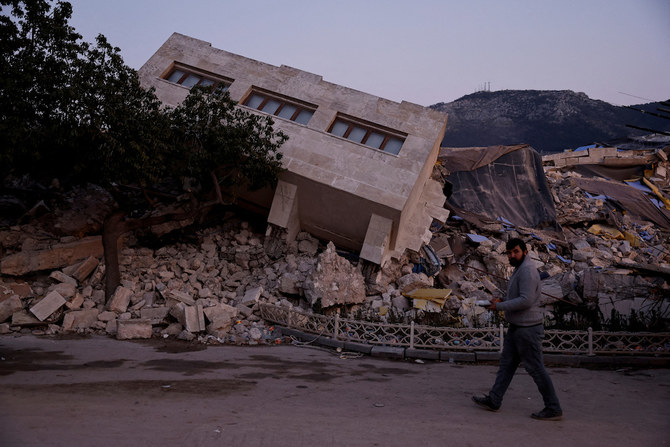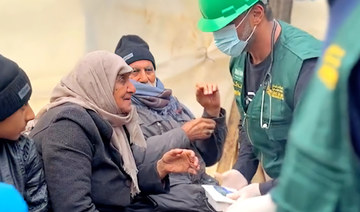ANKARA: The death toll from the earthquakes in Turkiye and Syria that struck on Feb. 6 surpassed 50,000 on Friday after Turkiye declared more than 44,000 people died.
The Disaster and Emergency Management Authority (AFAD) said the death toll in Turkiye due to earthquakes rose to 44,218 on Friday night.
With Syria’s latest announced death toll of 5,914, the combined death toll in the two countries rose to above 50,000.
This comes as Turkiye has begun work to rebuild homes following this month’s devastating earthquakes, a government official said on Friday.
More than 160,000 buildings containing 520,000 apartments collapsed or were severely damaged in the Feb. 6 earthquakes that killed tens of thousands in Turkiye and neighboring Syria.
President Tayyip Erdogan has pledged to rebuild homes within a year, although experts have said the authorities should put safety before speed. Some buildings that were meant to withstand tremors crumbled in the latest earthquakes.
“For several projects, tenders and contracts have been done. The process is moving very fast,” the official said, speaking on condition of anonymity, adding there would be no compromise on safety.
Authorities say tents have been dispatched for the many who are homeless, but people have reported trouble accessing them.
“I have eight children. We are living in a tent. There is water on top (of the tent) and the ground is damp. We are asking for more tents and they don’t give them to us,” Melek, 67, who was waiting in a line to collect aid outside a high school in the town of Hassa.
The school was being used as an aid distribution center by a group of volunteers called Interrail Turkiye. One volunteer, Sumeyye Karabocek, said the shortage of tents remained the biggest problem.
Erdogan’s government has endured a wave of criticism over both its response to the devastation and what many Turks say were years of non-enforcement of construction quality control.
The Turkish government’s initial plan now is to build 200,000 apartments and 70,000 village houses at a cost of at least $15 billion, he said. US bank JPMorgan had estimated rebuilding houses and infrastructure will cost $25 billion.
The UNDP said it estimated that the destruction has left 1.5 million people homeless, with 500,000 new homes needed.
It said it had requested $113.5 million from the $1 billion in funds appealed for by the United Nations last week, adding that it would focus this money on clearing away mountains of rubble.
The UNDP estimates that the disaster had produced between 116 million and 210 million tons of rubble, compared with 13 million tons of rubble after the earthquake in northwest Turkiye in 1999.
Turkiye also issued new regulations under which companies and charities can build homes and workplaces to donate to the urbanization ministry for people in need.
Many survivors have left the region of southern Turkiye that was hit by the quake or have been settled in tents, container homes and other government-sponsored accommodation.
In Antakya, Saeed Sleiman Ertoglu, 56, loaded up what remained of his stock from his waterpipe shop that was not damaged.
“The glassware was very beautiful, more than usual, but then we had this (earthquake), and it all got ruined,” he said, after his home and shop survived the first tremors but not the later one. He estimated that just 5 percent of his merchandise survived.
“What can we do?,” he said. “This is an act of God, and God’s will always bears gifts.”
(With Reuters)


Earthquake death toll surpasses 50,000 in Turkiye and Syria
Short Url
https://arab.news/cy6za
Earthquake death toll surpasses 50,000 in Turkiye and Syria

Turkiye arrests two on charges of spying for Israel

- Security sources said Mehmet Budak Derya and Veysel Kerimoglu had been arrested in Istanbul
- They had long been on the radar of Turkiye’s MIT intelligence agency
ISTANBUL: Turkish intelligence has arrested two people on suspicion of spying for Israel’s Mossad and providing information that helped the spy agency target its enemies, state news agency Anadolu reported Friday.
Security sources said Mehmet Budak Derya and Veysel Kerimoglu had been arrested in Istanbul, saying they had long been on the radar of Turkiye’s MIT intelligence agency.
Derya, a mining engineer, allegedly first caught the attention of Mossad in 2005 when he opened a marble quarry near the southern coastal city of Mersin and began trading overseas, first contacting him via an individual called Ali Ahmed Yassin in 2012, the sources said.
Investigators said Yassin, who ran an Israeli shell company, invited Derya for a business meeting in Europe in 2013 which is where he allegedly first met Mossad agents, they said.
During the meeting, they discussed the marble trade and suggested he hire a Turkish citizen of Palestinian origin called Veysel Kerimoglu, they said.
The men became friends and allegedly began sharing information with Mossad, who paid Kerimoglu’s salary, they said.
Through Kerimoglu, Derya is alleged to have increased his Middle Eastern activities, building social and commercial ties with Palestinians opposed to Israel’s policies and allegedly sharing information about them with Mossad.
The men are also alleged to have sent through technical information and photos of premises they were looking to acquire, notably in Gaza.
In early 2016, Kerimoglu is alleged to have suggested to Derya to begin supplying drone parts, with the businessman making contact with Mohamed Zouari who was killed in Tunisia later that year, allegedly by Mossad, investigators said.
Zouari — an engineer who specialized in drone development for the Palestinian Hamas movement — was gunned down in his car in the eastern city of Sfax in December 2016.
Late last year, a Tunisian a court convicted 18 people in absentia over his murder.
Derya is alleged to have used an encrypted communication system to send technical data to his handlers, and underwent two lie detector tests in 2016 and 2024.
He was arrested while trying to set up a company that would have overseen three Asian shell companies whose aim was allegedly to hide the origins of various products that would have been supplied to buyers on Mossad’s radar.
The plan was allegedly discussed in detail at their last meeting in January.
Both suspects are currently being questioned by police, they said.
Security sources said Mehmet Budak Derya and Veysel Kerimoglu had been arrested in Istanbul, saying they had long been on the radar of Turkiye’s MIT intelligence agency.
Derya, a mining engineer, allegedly first caught the attention of Mossad in 2005 when he opened a marble quarry near the southern coastal city of Mersin and began trading overseas, first contacting him via an individual called Ali Ahmed Yassin in 2012, the sources said.
Investigators said Yassin, who ran an Israeli shell company, invited Derya for a business meeting in Europe in 2013 which is where he allegedly first met Mossad agents, they said.
During the meeting, they discussed the marble trade and suggested he hire a Turkish citizen of Palestinian origin called Veysel Kerimoglu, they said.
The men became friends and allegedly began sharing information with Mossad, who paid Kerimoglu’s salary, they said.
Through Kerimoglu, Derya is alleged to have increased his Middle Eastern activities, building social and commercial ties with Palestinians opposed to Israel’s policies and allegedly sharing information about them with Mossad.
The men are also alleged to have sent through technical information and photos of premises they were looking to acquire, notably in Gaza.
In early 2016, Kerimoglu is alleged to have suggested to Derya to begin supplying drone parts, with the businessman making contact with Mohamed Zouari who was killed in Tunisia later that year, allegedly by Mossad, investigators said.
Zouari — an engineer who specialized in drone development for the Palestinian Hamas movement — was gunned down in his car in the eastern city of Sfax in December 2016.
Late last year, a Tunisian a court convicted 18 people in absentia over his murder.
Derya is alleged to have used an encrypted communication system to send technical data to his handlers, and underwent two lie detector tests in 2016 and 2024.
He was arrested while trying to set up a company that would have overseen three Asian shell companies whose aim was allegedly to hide the origins of various products that would have been supplied to buyers on Mossad’s radar.
The plan was allegedly discussed in detail at their last meeting in January.
Both suspects are currently being questioned by police, they said.
© 2026 SAUDI RESEARCH & PUBLISHING COMPANY, All Rights Reserved And subject to Terms of Use Agreement.












